20 min read
Path to Well-Being in Law — Episode 1: Beginnings
Podcast co-hosts Bree Buchanan and Chris Newbold, who also serve as co-chairs of the National Task Force on Lawyer Well-Being, introduce...
We've crafted solutions tailored to your firm
The world of insurance for law firms can be confusing, and difficult to navigate. We've created this glossary because these common insurance terms should be easy to understand.
16 min read
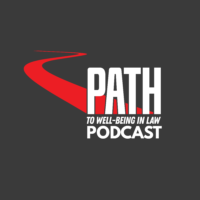 Bree Buchanan & Chris Newbold
:
Updated on November 15, 2023 | Posted on February 17, 2021
Bree Buchanan & Chris Newbold
:
Updated on November 15, 2023 | Posted on February 17, 2021
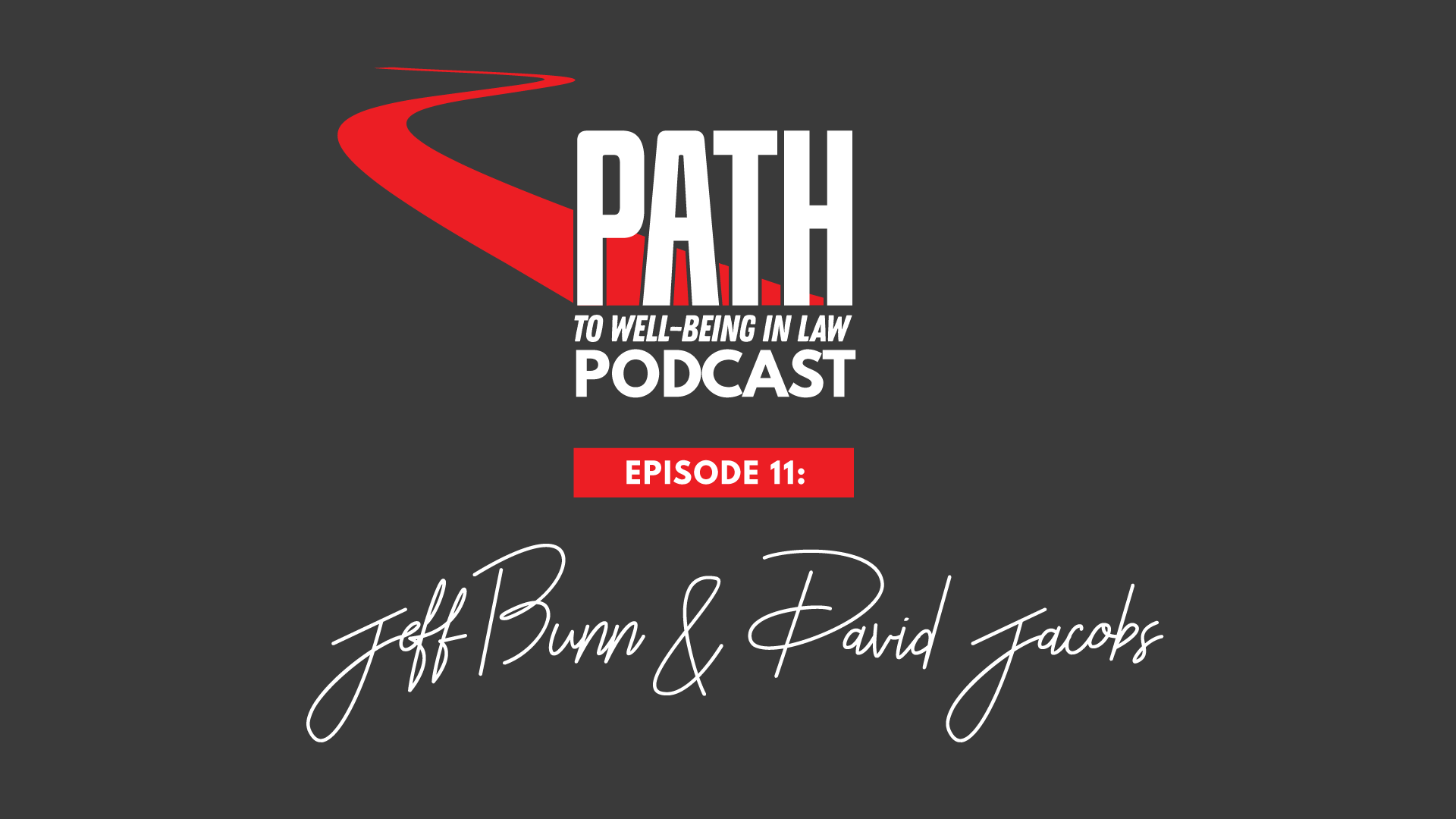
Stressed? Overwhelmed? You are not alone, especially as a lawyer. Left unnoticed, too much stress will negatively affect your ability to think and work. On this episode of Path to Well-Being In Law, attorneys David Jacobs and Jeff Bunn reminisce about the events that catalyzed their passion for mindfulness and wellbeing. Today they are advocates for the prioritization of wellbeing and work to share its benefits with other practitioners of law who are struggling in this highly demanding field. They both discuss a couple of big events that are coming up in the well-being space, including The National Conference on Lawyer Well-Being on April 7th and Well-Being Week in Law May 3rd-7th. During the conference, David and Jeff work with attorneys and law practices to address job-related anxiety and stress, and help them find solutions to those problems by implementing strategies for wellbeing.
Transcript:
CHRIS NEWBOLD:
Hello, and welcome to the Institute for Well-Being in Law podcast series, the Path to Well-Being in Law. I’m your co-host, Chris Newbold, executive vice president of ALPS Malpractice Insurance. And as you know, our goal here is to introduce you to thought leaders doing incredible work in the space of lawyer well-being within the legal profession, and in the process, build and nurture a national network of well-being advocates intent on creating a culture shift within our profession. Once again, I’m joined by my co-host, Bree Buchanan. Bree, how are you doing today?
BREE BUCHANAN:
I’m doing great, Chris. Great to be here.
CHRIS:
Good. We’re heading into the winter. I know our forecasted high tomorrow is supposed to be one degree. It’s going to be quite cold, so bundle up. I know that one of our guests here is from the Chicago-land area. I’m presuming it’s going to be cold there as well, so…
JEFF BUNN:
Oh, yes.
CHRIS:
Yeah. Yeah. Well, good. Hey, today, we’re going to shift our conversation a bit to the issue of information sharing and education in the well-being space. And we have an exciting event coming up on the calendar. We’re very excited to be joined by a couple of friends in the well-being space, David Jacobs of the Wellbeing Work Alliance, and Jeff Bunn, who does similar work with the Alliance and also is known nationally as The Mindful Law Guy. I’m going to pass it to Bree to introduce our guests.
BREE:
Absolutely. Thanks, Chris. So we have the two organizers of the National Conference on Lawyer Well-Being. So please, everybody, mark your calendars. That is a co-production between the Wellbeing Work Alliance and the Institute for Well-Being in Law. So we’ve got the Institute here represented by me and Chris. And then the Wellbeing Work Alliance, we have with us today David Jacobs and Jeff Bunn. They both have been lawyers for a good long while, but one has been on the UK side, and Jeff is here in the United States. David, in the UK, has been running the Legal Training Consultancy. Jeff, in the Chicago area in the United States, has run the Mindful Law Coaching. And they have come together to create the Wellbeing Work Alliance.
And pretty recently, they approached the Institute to see let’s collaborate on this and put on a show, and that’s exactly what we’re going to do. So guys, I want to ask you, you have to sort of go through what we do with all of our guests. This is not hazing, but it is a tradition. We ask our guests what it is that has brought you to the well-being movement in the legal profession, and we found there’s almost always an interesting story behind that. So let me just ask David, what brought you to this space and what drives your passion for this work?
DAVID JACOBS:
Well, it’s actually quite a sad story, so you might want to have a handkerchief or two close by. What happened to me 12 years ago, 12 years ago last month, I contracted a bug, which is necrotizing fasciitis, which is basically described by the media as a flesh-eating bug. It’s not quite right, but it will do. I entered what we call here A&E, which is Accident and Emergency, at the local hospital. And I was basically let down by the medical people. They didn’t know what they were dealing with. They didn’t follow up on recommendations from consultants. They didn’t watch and analyze the blood tests. So from the morning, I was left until midnight before they took me down to the operating theater to find that my arm, which had been giving me severe pain, was a complete mess, so much so that they couldn’t save it.
And over the next couple of days, I was taken down several days, several times to surgery. And eventually on that Friday, they amputated my left arm up to the shoulder to save my life. And at one time, I was given a 5% chance of pulling through. And my brother-in-law, who was a consultant, not at that hospital, told the family to prepare for the worst. But obviously, I did pull through. I was in hospital for nine weeks. I was in an induced coma for 10 days, intensive care for 14 days. And it became obvious, as I became better, that this was down to the clinical negligence of the doctors.
I got through this without any psychological help, and they told me that I would return to work within 14 months, one month for every day in intensive care. And I thought to myself, “No, it’s not. That’s not going to happen.” And I actually got back to work in about nine weeks after leaving hospital. And I was treated… I was working as a consultant in the training field then, and my return to work was celebrated like I was a heroic soldier coming back from winning a battle. And I was treated, as I said, like a hero. And that was nice at the time. But I began to think that if this had been a mental problem, if I’d had a breakdown, then I was 100% convinced that my treatment would have been completely different. People would have questioned my ability to do the job. And probably, I might have done as well.
But one thing led to another, and I got involved in hypnosis and mindfulness and meditation and things like that. And within some years, lawyers and not just that, everybody in the city of London who was working in a high-pressure job, it was a status thing. They’d work for 24 hours non-stop. And then what happened is that somebody… A young person was working in, I think it was a bank, and they basically worked too long. And I don’t know what the circumstances were, but they died. It was at that sort of stage that the mentality seemed to change. And I was fascinated in this because when it had been a sort of macho thing, people became more caring. And my interest in this whole area of well-being shot up because I felt that there was a synergy here between doing something good and also something that was commercial, had commercial potential. So that’s basically what happened. That takes us up to the establishment of the Wellbeing Work Alliance.
JEFF:
That’s quite a story, David. My story, guys, is a lot less dramatic and perhaps a bit more serendipitous. I practiced for most of my professional life in the city of Chicago, Cook County, where there are plenty of sharp elbows. And as I was growing up as a young lawyer, it was very much… The attitude was very much if it’s too hot in the kitchen, then get out. Just go do something. This is the world that I grew up in in practicing. That’s just the way it was, or so I thought.
Wind the tape forward several decades. I was walking the dog, slipped on some ice, tore my meniscus. I used to be a big-time runner. That’s how I dealt with the stresses and anxieties of the practice. And after I tore my meniscus, I got scoped. I couldn’t run anymore. So as a kind of low-impact, no-impact alternative to running, I got into yoga. I found a class in the Chicago Board of Trade Building, and I started going there. They had classes there at lunch.
And through the course of yoga, I developed a new kind of awareness. And I took note of not only my body, but also my mind. The guy who owned that studio, who was a former trader himself, turned me onto meditation and suggested to me that this was something that I ought to pursue because I probably would enjoy it. And it took me a couple months, but I went on retreat. And you know what? He was right. So for several years after that, I thought initially, even though these practices, yoga and meditation and mindfulness, were helping me a lot, I thought it was just me. And then I came to be of the mind that actually the men and women who practice in Cook County could also benefit. And I found myself thinking benefit by, I should say, a greater awareness of… It started off, my focus was mindfulness and meditation. That kind of grew into a larger concern about just well-being.
And then through the fantastic work of your predecessor organization, The National Task Force for Lawyer Well-Being, I came to learn a lot more. And I thought, “You know what? I need to become… I’ve kind of done the law thing. I need to become more of an advocate and share some of my insights and my concerns with others.” And that’s what kind of got me into the well-being space.
CHRIS:
Excellent. Well, we, first of all, appreciate all of your work and dedication. Obviously, these stories are all unique and give us different pathways and perspectives into kind of why people find themselves looking for how we can make for a better profession. I’d love to transition and hear from both of you about what you’re up to right now. I know we’ll talk about the conference in a quick minute. But David, you’re associated with the Wellbeing Work Alliance. What, in fact, is that? And give us some perspective on what the mission of that is and what you’re trying to do.
DAVID:
Yeah, sure. I mean, basically, we’re involved in the delivery of education, information, training, and advice on well-being for lawyers. Our work so far has primarily been in relation to the creation of two hugely successful conferences. I mean, there is no other way of describing it, and I’m not sort of exaggerating. We held one national conference in the UK two years ago, which was face to face. And then we ran another online one. And I think, in fact, the online one was better. There was some sort of feeling… Well, the important thing about it, and I hope this will take place in the one that we’re doing in the U.S., that people are sharing their stories, their backstories. It was very, very moving to sit there and listen to people, watch them explaining about the problems that they’ve had in the past and how they’d overcome them. And that’s a very, very powerful message.
In terms of what we’re doing at the moment, we are in discussions with a number of people with regards to in-house work. In other words, going into law firms and talking to them about how we can help them in their mission to achieve well-being for their members of staff, and also to make the commercial case for well-being. I think that’s an important point to get over, that it’s a win-win situation, because it has a great effect on the bottom line, on profitability, on staff retention, on a whole load of things. We’re also running another conference in the UK, the third national conference in the UK, and that’s going to be on June the 17th. Whether that’ll be live or not, I suspect it won’t, but that isn’t an issue. And we’ll run that again. It’s a four-day conference.
CHRIS:
Yep. And Jeff, if we could just have you kind of provide us some perspective of where you’re at. I know that you’ve been a leader in the mindfulness space, and I know that you’re doing a lot of now coaching and consulting. Give us some perspective on kind of what you’re up to.
JEFF:
Yeah, well, that’s… Thanks for asking, Chris. That really has been my focus. What I had found myself before I decided to stop practicing law, I found myself thinking a lot about different things. Mindfulness and meditation were inevitably parts of those things, but I never got to finish my thoughts. I was always interrupted by work. You have to take care of clients. You have a brief you’ve got to file. You have a call you have to make and prepare for, or what have you, which is what got me of a mind to start the Mindful Law Coaching and Consulting Group. The purpose of that organization is to help lawyers, both small individual lawyers or firms, design and implement appropriate well-being programs as part of their business platform.
Just anecdotally, it’s a little bit off topic, but the way I met David was through LinkedIn, which is my kind of social medium of choice. And I saw an ad, advert for the second annual conference, well-being conference, that he referenced just a moment ago. And I thought, “Wow! We need to do something like that here.” The National Task Force had done a tremendous job of kind of creating a little bit of momentum there, but I wanted to take it a little bit further. So that got me… I fired off a comment along the lines of, “Gee, we need to do something like what you’re doing in the UK here in the U.S.” And reached out to me. We talked a little bit and got to know each other and then decided, “You know what? Let’s do this.” We do need to further the work that the National Task Force had begun, try and create a broader awareness, if you will, of well-being, and try to encourage as many people as you, or more people really, than you and your group already had. And that’s kind of what got us going.
BREE:
Yeah. It really seems like it’s sort of the right idea at the right time and building on past successes that y’all have had in the previous conferences. So let’s talk a little bit about the nitty-gritty of the National Conference on Lawyer Well-Being on April the 7th. Tell us who is your intended audience? Who should participate in this?
JEFF:
David, you want to take a crack at that, or shall I?
DAVID:
You have a go, I think.
JEFF:
Well, for starters, it’s honestly going to be lawyers. I mean, that’s what I know. The practice of law is what I’ve done my entire adult life. I think the same is true of David. And the pressures of that profession, which are not unique necessarily to the profession of law, but I think maybe the ways in which those pressures manifest themselves may be unique. But having said that, that’s the world that I know. It’s a world that David knows. The concept, the broader concept of well-being fits so nicely into, I think, the business view of what the practice of law is all about.
One of the things that had occurred to me that I think I mentioned to David a good long while ago, is it took the longest time, it was probably 10 to 15 years, for people to finally figure out that physical fitness is important and impacts their performance. It impacts them personally. It also impacts their performance, I think, professionally. So finally, it seems that most everyone understands the value of physical fitness.
My concern, particularly for lawyers, was what about mental or emotional fitness? That’s part of the bigger picture as well. And the attention that we pay to physical fitness, while it serves perhaps different goals and manifests itself perhaps in different ways, it’s really no different than mental or emotional fitness. So I think bringing those two together, the physical and the mental part, is really important. So audience-wise, I got a little bit away from what you had asked me. Audience-wise, my target really is lawyers, individual lawyers and law firms, which are businesses that are obviously comprised of individual lawyers.
BREE:
Right. I know in conversations we’ve had, you’re also doing some interesting thing with the pricing structure for registration, and so some things to encourage academics, people in law school and, I think, law students. Talk a little bit about that. Who are the other people you are encouraging to attend?
JEFF:
David, do you want to again? I’ll keep talking, man. [crosstalk 00:19:38].
DAVID:
Oh, okay. No, the other thing I was going to mention is that if this is going to be anything like the profile of those who were attending the UK conferences, there’ll be a split between lawyers, HR people, and training people. And in terms of the speakers that we’ve got, that replicates that sort of issue. We’ve got directors of well-being, directors of coaching and well-being, people like that who are speaking, as well as the people who have a more legal background. But certainly, out of the four people who are speaking from the UK, one is a practicing barrister, a QC, one is an ex-employment lawyer who now runs a well-being consultancy. The other one is another ex-employment lawyer, who is now full-time on the well-being front. So that’s the sort of profile of the speakers. And as I was saying to begin with, I suspect that there will be a split between lawyers and HR people plus some trading people as well.
JEFF:
Well, David, let me just jump on that and speak to the concern that I heard Bree raise, which is we do care a lot about law students. They are, after all, the future of the profession. We care a lot about law academics, the men and women who are teaching those law students and have an opportunity to perhaps supplement some of the substantive legal issues that they’re teaching with self-care issues. So one of the things that we were thinking of in terms of this particular conference is, if you will, it’s almost kind of subsidizing law students or law academics through subscriptions that may come from lawyers or law firms.
And one of the things that… David, I think, came up with the idea originally, which I think is marvelous, is let’s support the people that are not yet earning the same kind of salary that practicing lawyers are. Let’s support the law academics. Let’s support the students. Let’s give the law firms or lawyers an opportunity to subsidize or supplement some of those men and women so that they too can hear the wisdom of a lot of our speakers and hopefully, in their own way, in their own time, translate the notion of well-being, the importance of well-being into the profession in the future.
CHRIS:
The content that you could bring to a well-being conferences is vast, right?
JEFF:
Yes.
CHRIS:
And I’m curious about how you’ve thought about structuring the conference in a way that can, again, play to multiple different audiences, but then kind of unify all attendees around some basic themes. So tell us about how you thought about the structure of the conference.
DAVID:
Shall I do this one?
JEFF:
Go for it, David. Please.
DAVID:
Yeah, okay. Well, our feeling is that the morning should be focusing on the issues relating to individual people, and the afternoon should be focusing on the issues that could help specifically law firms deal with the issues. And we’ve got a range of things, from understanding anxiety, to the what and why of well-being for lawyers and why mental health matters for lawyers, to the critical issues of things like putting it all into practice. I mean, I don’t believe that well-being should ever be a ticking-the-boxes thing. I think it should be done either with a good heart and with the intention of making it work, or it shouldn’t be done at all. There’s no half measures here.
And what we’re trying to get, trying to do is to cover the issues in the morning, as I said, for the individual lawyers, and in the afternoon, look at how we can solve the problems. And we’re going to offer people the opportunity to go to the morning or the afternoon or to attend both. And as the thing will be recorded, plenty of people will be able to see it after the event. Certainly, my experience in the UK is that this approach works. And out of the people that book, 75% will attend on the day and roughly 25% will listen to it afterwards, because what with lockdown as an issue, people may not have the time to spend the whole day at a conference. So they may want to watch bits in the morning. They may come back and watch bits in the afternoon and watch all of the rest on a recorded basis. It gives people the maximum flexibility.
BREE:
Yeah. I really love how you can sort of customize it to your schedule, which is great. And I also really appreciate, I think of it as sort of a progressive idea, of the subsidizing law students and law professors so they can attend. I haven’t seen that before. So that’s really great. So guys, if somebody wants to register or find out more about this, what should they do? Where can they go?
DAVID:
Well, at the moment on the website, there’s a waiting list, which some people have joined. And over the next week, we will be rolling out the final version of this. So people will be able to book directly from that website, and that should be within… Well, that will be within the next week.
CHRIS:
Yeah. And that will probably be well… So active registration will be open by the time that this podcast ultimately posts, right? So it’s fair to say that by late February, registration will be open?
JEFF:
Oh, yeah.
DAVID:
Oh, yeah. No, before that, it’ll be… I mean, the target day is next Tuesday, and I don’t see any reason why we shouldn’t comply with that.
CHRIS:
Okay. What other things do you want to relay to our listeners about the conference, the themes, the speakers? Any other things that you think are important for listeners to appreciate as they decide whether this is a… Certainly, I’ll play an active role, I think, in the conference. I know Bree’s planning. There’ll be a keynote, I think, in between the two modules, and we’re excited for that. So any other things that you’d like to relay to listeners about the upcoming conference?
JEFF:
Well, I’d like to just jump on one thing. Reinforce, I guess, is probably a better word, way of putting it. One thing that David had mentioned, I think the idea behind, as I conceive the conference, is to elevate the conversation or the awareness surrounding well-being to a point where well-being or a well-being program is not just something that’s nice to have. It’s something that you need to have, you being the law firms, which kind of gets to the question, I think, Chris, that you had posed before.
The audience is vast, of course. And I know that the National Task Force did a tremendous job in its report of divvying up its broader message into the various stakeholder groups. It’s a lot that was accomplished in the report. It’s probably more… Our, I think, determination was, it’s more than one conference can or ought to even attempt to address.
So there are certain groups, such as, say, judges or bar associations or law schools or what have you, there are a number of different stakeholder groups that would probably implement well-being in a slightly different way or for a slightly different purpose. That said, the breadth of those groups and the ability to address the kind of interests and the issues or the methodologies or the metrics is so diverse that it’s… I think the determination was, let’s keep it relatively limited in scope. And hopefully, if the work of the Institute continues and the issue continues to take root in the profession, there will be other opportunities in the future, and perhaps those other stakeholder groups can be addressed then. But the goal is, as I’m sure is true for the Institute as well, is to make the idea of well-being a pillar of the foundation, not just something that’s nice to have. It’s something that we really need to address.
CHRIS:
Well, good. Well, first of all, thank you for your work. I mean, I know that the Institute for Well-Being in Law, one of our missions is to continue to be active on the education front. But it’s a big tent, as we’ve said, and we need folks like you, David, and you, Jeff, to be leaders in developing content. Content is so important, particularly given the pandemic. Content is king right now. So your ability to bring valued content to the well-being community is both appreciated, and we’re very much excited to be working with you on this particular project.
BREE:
Absolutely, and we’re looking forward to being a part of it too. It’ll be great.
JEFF:
Yeah, yes. Yeah.
DAVID:
Thank you.
JEFF:
Both Bree and Chris, by the way, will be prominent parts of the program, so thanks to both of you.
BREE:
You’re welcome.
DAVID:
Absolutely.
BREE:
It’s our pleasure.
CHRIS:
And I think it’s safe to say, Bree, that we’ll also have links on the lawyerwellbeing.net webpage for the conference.
BREE:
Absolutely.
CHRIS:
So that will be also a very fast way for our listeners to be able to access registration information for the conference. And I did want to take a quick additional plug for, coming up in early May, Well-Being Week in Law is fast approaching, May 3rd to the 7th. And another great education-based week led by important folks in the well-being space, Anne Bradford and others, and we’re excited for that. So we’ve got a couple of big events coming up in the well-being space, both with this April 7th conference and Well-Being Week in Law in early May. Bree, any closing thoughts?
BREE:
No, it’s an exciting time to be doing this work.
CHRIS:
Excellent. Well, again, thank you. Thank you, David. Thank you, Jeff. And we again thank you for your leadership in developing the conference, and consider us a friend and an active promoter as we continue to move forward.
JEFF:
Yay!
DAVID:
Thanks very much. That’s great.
BREE:
Thank you, guys.
CHRIS:
All right. Thank you.
JEFF:
Thanks.
BREE BUCHANAN, J.D., is Senior Advisor for Krill Strategies, LLC, a position she came to after her tenure as Director of the Texas Lawyers Assistance Program of the State Bar of Texas. She serves as a founding co-chair of the National Task Force on Lawyer Wellbeing and is immediate past Chair of the ABA Commission on Lawyers Assistance Programs (CoLAP). ________________________________________________________________________CHRIS L. NEWBOLD is Executive Vice President of ALPS Corporation and ALPS Property & Casualty Insurance Company, positions he has held since 2007. As Executive Vice President, Chris oversees ALPS business development team, sales strategy and is ALPS’ chief liaison into the bar association community, where ALPS is endorsed by more state bars than any other carrier regardless of size.
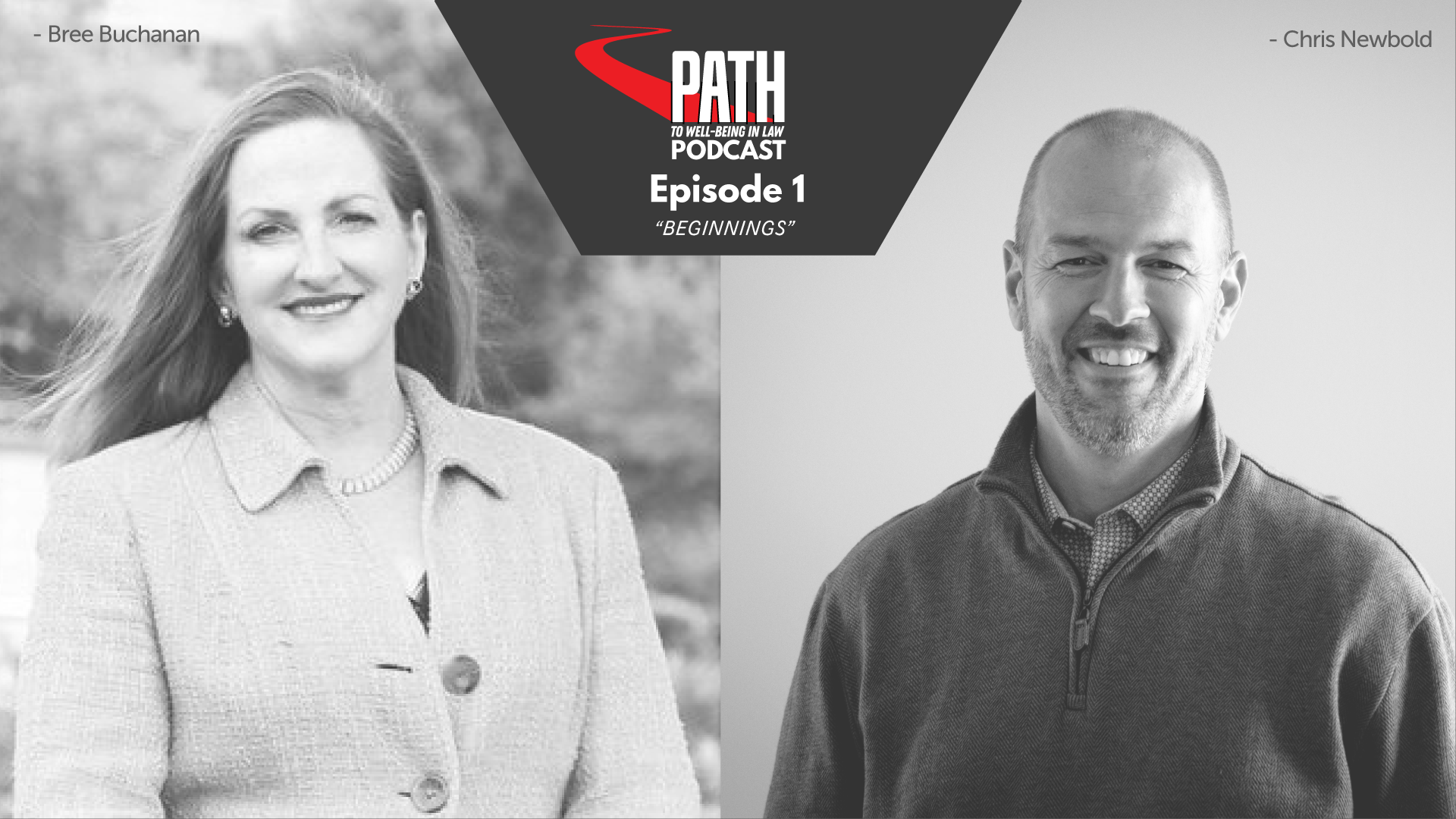
20 min read
Podcast co-hosts Bree Buchanan and Chris Newbold, who also serve as co-chairs of the National Task Force on Lawyer Well-Being, introduce...
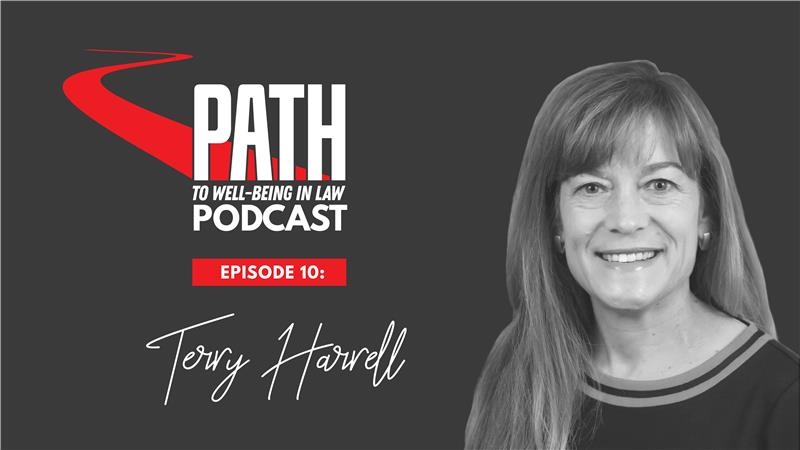
27 min read
Terry Harrell completed her law degree at Maurer School of Law and her Master of Social Work Degree (MSW) at Indiana University. Terry is a...
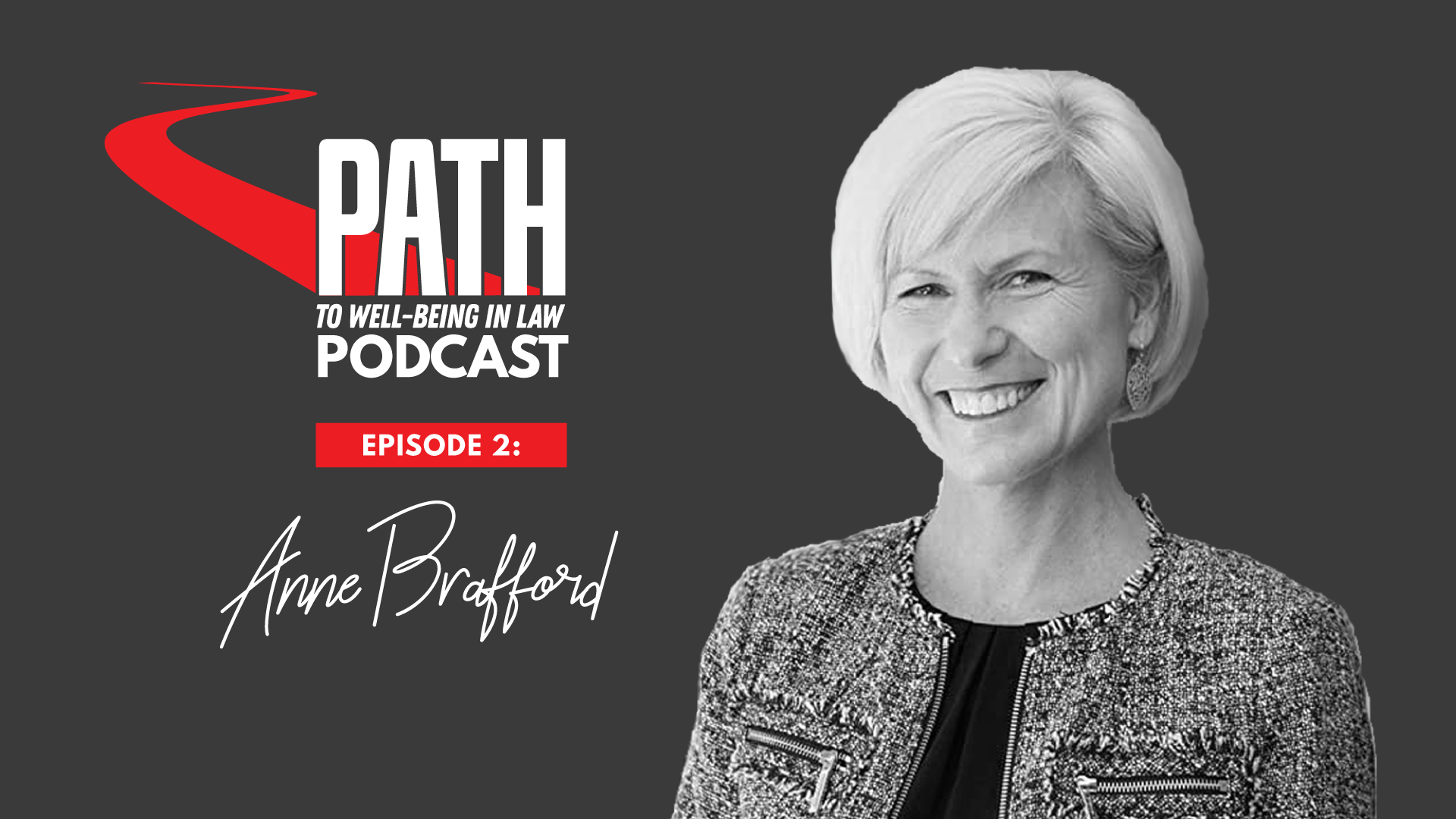
25 min read
Bree and Chris welcome lawyer well-being pioneer Anne Brafford to the podcast, best known for her roles as author of Positive Professionals,...